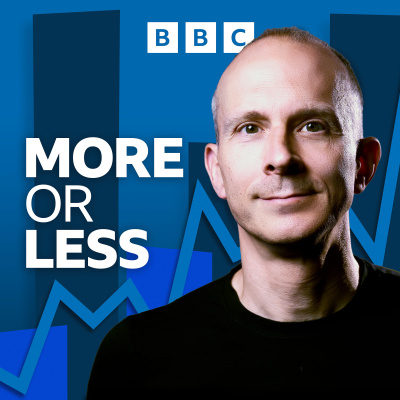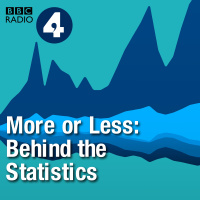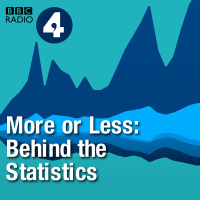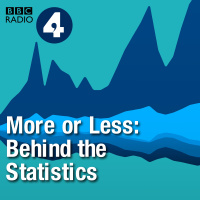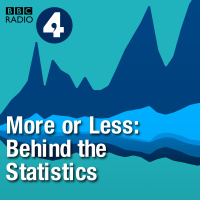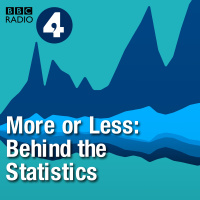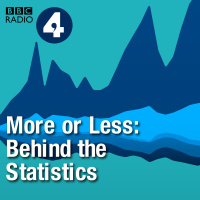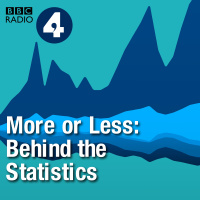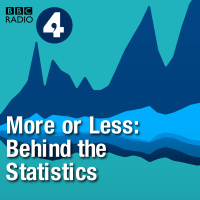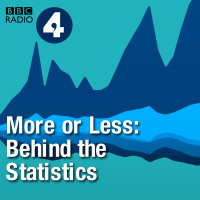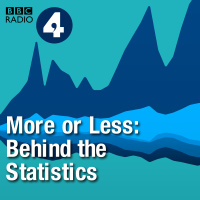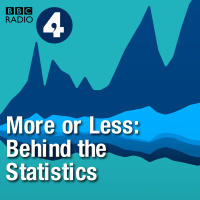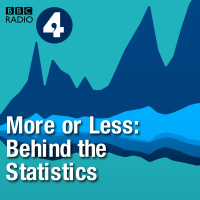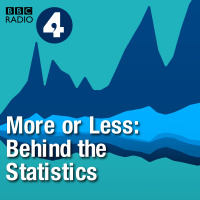Synopsis
Tim Harford and the More or Less team try to make sense of the statistics which surround us. From BBC Radio 4
Episodes
-
Sweden’s polarising pandemic response
30/04/2022 Duration: 08minWhen much of Europe went into lockdown at the start of pandemic, Sweden’s lighter touch strategy got lots of attention. Fans of the approach say it was a huge success that showed lockdowns were pointless. Opponents say it has been a disaster. But what do the numbers say?In this episode of More Or Less, Tim Harford and journalist Keith Moore carve a nuanced path through one of the pandemic’s most polarising approaches.
-
Understanding India through Data
23/04/2022 Duration: 08minHow do you go about understanding a country with a population as diverse as it is vast?Data journalist Rukmini S is the author of Whole Numbers and Half Truths: What Data Can and Cannot Tell Us About Modern India. Tim Harford spoke to her about the power and pitfalls of using statistics to make sense of modern India, from basic questions like average income to the huge challenges of keeping track of Covid.
-
Subitising and simplifying: how to better explain numbers
15/04/2022 Duration: 08minHave you ever looked at a numerical claim and thought ‘what on earth does that mean?’ Complex numbers are often badly communicated, making it difficult for the public to appreciate what they signify - but dial things down too much and you’re at risk of oversimplifying important issues. It’s a tightrope walk authors Chip Heath and Karla Starr have explored in their new book ‘Making Numbers Count’. Tim Harford talks to them about how we can improve the way we communicate numbers to the general public. Producer: Lizzy McNeill (Image: Child in front of numbers, Credit: Getty Images)
-
Did tea-drinking cut deaths in the Industrial Revolution?
09/04/2022 Duration: 08minCould an explosion in tea-drinking explain a decline in deaths in England during the industrial revolution? Professor Francisca Antman, an economist at the University of Colorado Boulder believes it might.Tim Harford discovers that dusting down the data from tea shipments and local burial records gives us surprising insight into how boiling water for tea accidentally improved public health. Presenter: Tim Harford Producer: Nathan Gower Sound Engineer: Graham Puddifoot
-
Will the war in Ukraine cause a global wheat shortage?
02/04/2022 Duration: 08minAs the Russian Invasion of Ukraine continues, the effects ripple around the rest of the world. One concern involves the wheat harvest. There have been claims that Ukraine and Russia supply 25% of the worlds wheat and that as a result we’re facing a global wheat crisis. We look into this misleading figure to determine what the real impact might be.
-
Pizza and Nuclear War
20/03/2022 Duration: 08minThe War in Ukraine has reminded the world how easily conflict might escalate into a Nuclear War. But according to Professor Barry Nalebuff of Yale University, good strategy and negotiating can help us with everything from avoiding Armageddon to dividing up a pizza fairly. Tim Harford talks to Barry Nalebuff about his new book, “Split the Pie”.Presenter:Tim Harford Producer: Lizzy McNeill
-
Does the UK take in more refugees than other European countries?
13/03/2022 Duration: 11minAs the war in Ukraine continues, Reuters has reported that some 2.3 million people have been displaced. So far many of those have sought refuge in neighbouring countries. The UN estimates that as of the 8th of march Poland has taken in almost 1.3 million refugees, Hungary just over 200,000 and Slovakia almost 100,000. In comparison the UK has issued visa’s to just under 1000 people. Some say this isn’t enough, however, Prime Minister Boris Johnson defended the governments record claiming that ‘"We've done more to resettle vulnerable people than any other European country since 2015." Sound familiar? Join us on a journey back to 2020 to find out whether this is accurate or just a repeated misleading claim.
-
Numbers in Ukraine and low seas in Chagos
06/03/2022 Duration: 08minFollowing Russia’s invasion of Ukraine, we take a look at some of the numbers coming out of the conflict and ask how to know which information you can trust during a war. We also investigate the perplexing claim that the seas around the Chagos Islands are 100m lower than the seas around the rest of the world.
-
Troop and Casualty Numbers in Ukraine
02/03/2022 Duration: 29minHow reliable are the figures coming out of the conflict in Ukraine?Following Russia’s invasion of Ukraine, we consider claims about the numbers of troops involved, people killed, and planes downed.Also: are the prime minister’s parliamentary claims about growing numbers of NHS staff backed up by data? We investigate the perplexing claim that the Chagos Islands are 100 metres below sea level. How long do you have to drive an electric car to offset the pollution from making the battery? And do we really make 35,000 decisions a day?
-
Did lockdowns save any lives?
27/02/2022 Duration: 08minLockdown. A word we’ve all become overly familiar with over the past two years. Lockdowns were intended to protect people, especially societies most vulnerable, from the risks associated with contracting Covid. However, a new study has been making headlines which claims to show that mandatory lockdowns have only reduced Covid-19 mortality by 0.2%, or one death in five hundred. We examine the evidence behind the claim.
-
Vaccinating children, lockdowns, and ebikes
23/02/2022 Duration: 28minJabs for five to 11-year-olds, lockdown effectiveness, and being green on two wheels.Governments across the UK have decided to offer Covid vaccinations to primary school-aged children. What was the data behind this decision?What effect did lockdowns have on preventing deaths from Covid? We look at a research paper that says almost none. Plus, is Elon Musk right to warn of a global population collapse? And can it really be greener to ride an e-bike than a good old-fashioned push bike?
-
Hospitalisation rates for children with Covid
20/02/2022 Duration: 08minCovid vaccines will be offered to all children across the UK between the ages of 5 and 12 - some months after the same decision in countries such as Italy and Germany. It is a topic that has caused a fair amount of controversy and with controversy often comes suspicious statistical claims. We look at the data behind child hospitalisations and deaths due to Covid19.
-
Questioning claims about Covid and children
16/02/2022 Duration: 29minHow likely are children to end up in hospital because of Covid? And how many have died?We scrutinise some scary stats that have been circulating on social and examine what excess deaths figures tell us about the risks of Covid compared to other illnesses.Plus, with the gift of hindsight, we examine the joys and sorrows of modelling the spread of the virus. Do MPs understand how false positive rates work? And we unwrap the mystery of the nanomoles.
-
Testosterone and sport
13/02/2022 Duration: 08minIn early December 2021 a member of Penn University Women’s Swim Team caused a stir. Lia Thomas not only won three events but she had the fastest time in elite college swimming in the country in two out of three races. This achievement reignited a debate as Lia Thomas is a transgender woman; we examine the rules around testosterone and trans women’s participation in elite sport.
-
The prime minister in statistical bother
09/02/2022 Duration: 28minBoris Johnson has been ticked off for misleading Parliament on jobs and on crime. He claimed that the number of people in employment has been rising - when it’s been falling. And he made a claim that crime has fallen - when it’s risen. We discuss the truth, and what Parliament can do to defend it.Plus, we examine the rules around testosterone and trans women’s participation in elite sport, and the spirit of Donald Rumsfeld is with us as we try to navigate the largely unknown world of fungi.
-
Can you fool your brain?
06/02/2022 Duration: 08minHave you given up on your New Year’s resolution yet? Every year many of us make the promise to become better, shinier, more accomplished versions of ourselves by the same time next year. It’s often easier said than done but to an extent it really is the thought that counts. David Robson, author of ‘The Expectation Effect’ says the power of our expectations can cause real physiological effects but Mike Hall, co-director of ‘The Skeptic’ magazine isn’t convinced.
-
Does the UK have the fastest growing economy in the G7?
02/02/2022 Duration: 28minConservative politicians have taken to the airwaves to tell us to forget the parties, and just look at the economic growth - but is the UK really growing faster than other leading economies?The Omicron variant has raised the chance that people are re-infected with Covid - how common is that, and should it change the way we read the statistics that are reported each day?The great statistician Sir David Cox has died; we remember his life and his contribution to the science of counting.And does comparing the number of food banks to the number of McDonald’s restaurants in the UK tell us anything about food poverty?
-
Fertility rates: baby boom or bust?
30/01/2022 Duration: 08minUnder lockdown, couples were destined to find themselves closer than ever before, but despite what you’d think – this didn’t result in a higher birth rate. In fact in developed countries across the world the birth rate is falling, we spoke to Professor Marina Adshade about why this is and what this could mean for the future.
-
Should you follow the 5 second rule? And does inflation hit the poorest harder?
26/01/2022 Duration: 28minFood writer Jack Monroe sparked national debate this week when she tweeted about food price hikes on the cheapest goods in supermarkets - but does inflation really hit low income households hardest?Social media and some news outlets have spread claims this week that only around 17,000 people have actually died of Covid. We debunk.We test the truth of the five second rule - is it a good idea to eat watermelon within five seconds of dropping it on the floor? And can you think yourself better?
-
Are female patients more likely to die if the surgeon is male?
23/01/2022 Duration: 10minIn early January several newspapers ran article claiming that ‘women are 32% more likely to die after operation by male surgeon. If true, this is a terrifying figure but is all as it seems? We dig into the data to find out whether women should really be worried about having a male surgeon.
